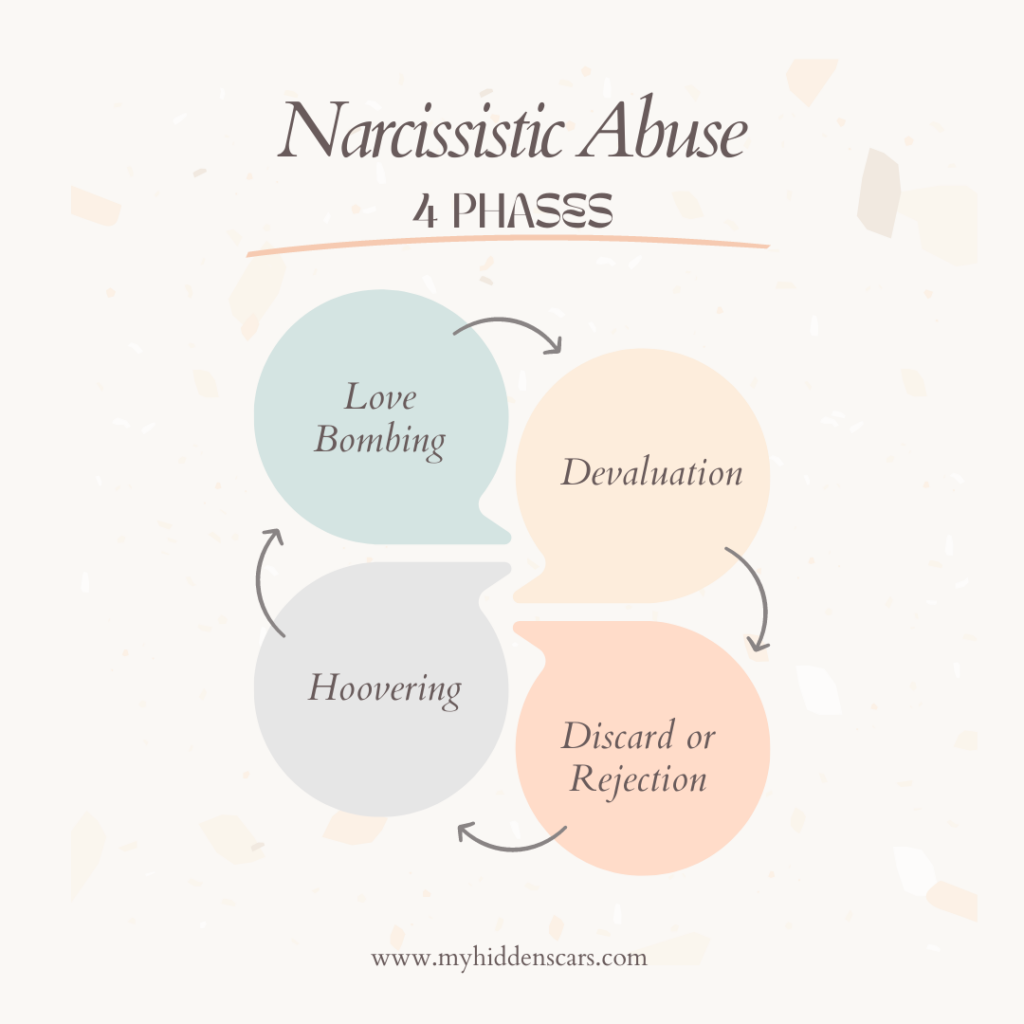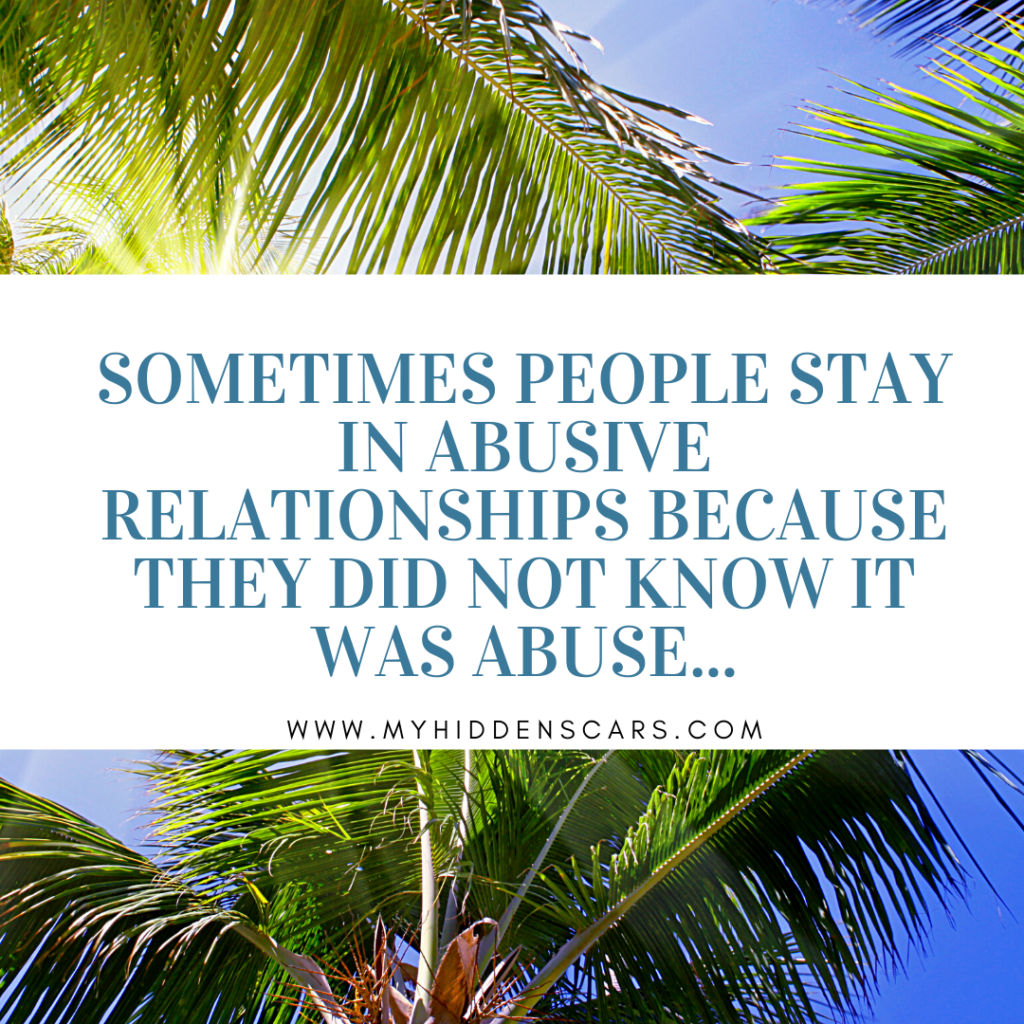From the beginning of my relationship with my ex-husband, there were signs of abuse and the narcissistic abuse cycle that would keep me sucked in for so long. I had no idea what I was getting myself into, or what I would later come to understand as the narcissistic abuse cycle had already started. It took me years to see the cycle for what it was and even longer to fully realize how abusive it had been.
Before we even started dating, we were friends and teammates, yet he was already beginning to groom me. He was sweet, charming, and encouraging most of the time we interacted. Once we started dating, it became a wild wave to ride. I had no idea that the wave I was riding would end up being a series of amazing waves and some wild wipeouts.
At barely 22, I had no idea what a narcissist was or that there was even a thing called narcissistic abuse. Of course, like many other college students, I knew a little about domestic abuse, but of course, I also thought I would never find myself in a relationship like that, I was too smart to fall for that. I had no idea what to look out for or when to run away. Like so many of us, I thought I would know if I was being abused, it would be just like I had seen on TV or in the movies. Needless to say, no one ever talks about the cycles, and you find yourself being swept up into the wave.
People often wonder why the victim doesn’t just leave when it comes to narcissists and narcissistic abuse. They treat you so poorly that most people think it would be easy to walk away. Unfortunately, it isn’t that easy. Each part of the narcissistic abuse cycle works together to keep someone sucked in and entangled in this crazy storm. Narcissists use a pattern or cycle of manipulation and behaviors that not only sucks their partner in but makes them question themselves. Each part of the cycle works together to keep someone sucked and entangled in this crazy storm.
When you have been sucked into this type of relationship, you may feel like you are on a merry-go-round, but not as fun as when you were a kid. You find yourself going round and round through the phases over and over. This merry-go-round or cycle of narcissistic abuse is love bombing (idealization), devaluation, discard (rejection), and hoovering. Each part of the narcissistic abuse cycle works together to keep someone sucked in and entangled in this crazy storm.
By understanding and recognizing the cycle, people in a narcissistic relationship can get the help they need and escape.

Phase 1 – Love Bombing/Idealization
All of us can remember starting a new relationship and all the feelings that go into it, the joy, happiness, and excitement about meeting someone new. This is often referred to as the honeymoon stage, but when you are caught up in a narcissistic relationship, things are different. A narcissist uses this phase as a tactic to establish a false sense of intimacy in hopes that you would lower your guard so that the relationship moves more quickly. In this phase, they will focus all their attention on the new partner and quickly talk about marriage and living together. There is a lack of boundaries, and they will often isolate the new partner claiming they “love them” and only want to be with them.
At the beginning of my relationship, things definitely moved quickly. While my ex waited for a few dates to kiss and be intimate, there were other signs. We would spend all day together at school, and then he would be at my house all evening, sometimes staying the night. He insisted that I meet his family, and we went out to a big fancy restaurant for his birthday and for me to meet them. It seemed as if all of my personal time and space were gone. My ex wanted and needed to be with me all of the time. I thought all of this was happening because I met the man of my dreams and he even told me that! Of course, I had no idea what was coming next!
Phase 2 – Devaluation
This phase of the narcissistic abuse cycle can leave you feeling like you can’t do anything right. Most couples slowly start forming a routine as the honeymoon stage wears off. They still love each other, but that initial excitement and euphoria starts to wear off. During this time, their intimacy grows, and they start learning how to work as partners.
When you are dealing with a narcissist, this is when they begin to devalue you. The narcissist starts putting you down. They nitpick, start blame-shifting, and ignite any insecurity you have. This creates self-doubt.
Nitpicking is something that sticks out to me. During this phase, I started hearing about how the house wasn’t the right way; never mind, he still technically lived at home with his parents. He would tell me how I should wear my hair, I didn’t need to take so long to get ready to go places, and my family wasn’t as good as his because my parents were divorced. All of these things hit me hard. I took pride in myself, my family, and my home. It was hard for me to understand why he did not like those things if he loved me so much, but that is what counted.
Phase 3 – Discard or Rejection
The discard phase in the narcissistic abuse cycle often leaves you feeling worthless. It is nearly impossible to have a relationship with someone and not have disagreements. Still, in a healthy relationship, both people work together to solve those disagreements and move forward.
When narcissists start the discard phase, they aren’t getting the attention they desire or demand. They start rejecting their partner and put all the blame for the relationship ending on their partner. A narcissist will do things such as disappear, cheat, invalidate feelings and emotions, and physically, emotionally, and verbally abuse their partner. Often times they will play the victim and then permanently or temporarily end the relationship, saying, “we need a break.” All of these things can happen gradually or all of a sudden.
Even before we got married, this discard phase happened a few times. Of course, I was too young and mainly naive to realize what was going on. We would date for a while, things would be great, and then slowly, he would pull away, blaming me for something. He would become the victim of something he thought I might have done. There were times he would need a break because he wasn’t sure about us, or even get mad because I would tell him I didn’t like how he touched me one day. I would always cry and beg him not to leave. Not only was I in this crazy abusive cycle, but I was trauma-bonded to him.
Phase 4 – Hoovering
Yes, this is like the vacuum! Hoovering is when the narcissist tries to suck their victim back in. The abuser will lurk on your social media and send emails and texts. They will be overly charming and loving. After some time apart, they will say things such as, “I’m sorry, I miss you so much. I promise to change, let’s try again,” or “I know we have some problems, I know we can work them out. I still love you.” They may try to make you feel guilty by accusing you of already dating someone new, or they will threaten to hurt themselves. Narcissists like to triangulate, so they will spread rumors about you or create fake emergencies to get you to be in contact with them.
Narcissists are doing this because they want something. An abuser wants to control you and manipulate you. Hoovering is a way for them to manipulate you back into the relationship. If you take them back, the cycle continues and gets worse and worse each time.
Over the years that I was with my ex-husband, both dating and married, I don’t think I can count the number of times that he hoovered me. Of course, most of the time, I had no idea that was what was going on. I honestly thought that our relationship meant that much to him, just like it did to me. Still, as I have learned more and more about narcissists, narcissistic abuse, and the cycles you go through, I know that wasn’t the case. I don’t think I can count how many different times I heard, “let’s try again,” “I know we have problems, but we can work through them,” or even, “I promise I will do better/change. Doesn’t our family/marriage mean anything to you?” Each time I fell for it, I believed him because I loved him.
Looking back over those years, I can see the cycles of narcissistic abuse that went on and how each time it happened, some of the cycles got longer, some shorter. But each time, it got worse, at least until I started figuring some of it out. While I may not have known I was in a narcissistic abusive relationship until the very end, I did start seeing the cycles and the game before I finally ended the relationship.

Breaking the Narcissistic Abuse Cycle
Breaking free from the narcissistic abuse cycle is probably one of the hardest things you will do, and then add in if it has been a long-term relationship or if you have kids together, and it takes it to a whole new level. This cycle is so hard to break because the narcissist has gaslighted you into thinking and believing that everything that happens is your fault. Once you realize what is happening, you can start making changes.
Boundaries
As you are trying to break free from the narcissist in your life, one of the most important things to do is set firm boundaries and be ready for them to try to push them to see where these limits are. These need to be clear on what you will and will not put up with from your narcissist. Remember, they will keep taking from you, don’t be fooled into thinking that they will like or appreciate these boundaries.
Let your narcissist sit in their discomfort and unhappiness. Trying to soothe their hurt ego or feelings will only continue the cycle of abuse. Second chances don’t work with narcissists. If they think they are going to lose you, a narcissist will do whatever it takes to keep you sucked in. Eventually, they will fall back into the same behaviors as before.
Therapy
Therapy is the only way to break free from the narcissistic abuse cycle. A therapist that understands narcissism, narcissistic abuse, and its cycles can help give you the support and tools you need to break free of this cycle and help you heal.
Therapy was the biggest thing for me! While we had seen many therapists together over the years, none of them ever saw what was happening. One of the last therapist we saw together is what opened my eyes to how crazy things really was in our marriage. We walked out of a session with her, and I remember her saying, “my head is spinning, is it always like this with you guys?” That is when I knew I was not going back to see her, and I needed to start my own journey with my own therapist. I found an amazing one that knew all about narcissists and the cycle of abuse that went on and worked to help me. I am unsure if I hadn’t had such an excellent therapist, I would have ever left or learned everything I know now.
Finally
Breaking the cycle of narcissistic abuse is about learning to manage your expectations and knowing they will never change. If you choose to stay in the relationship, you must be careful with what you say and do. Don’t share important things in your life. Stick to things that don’t raise emotions in the narcissistic abuse cycle. If emotions do rise, walk away. If you fight back, you will give them the power they want, and they will win.
The best choice, if possible, is to end the relationship and walk away from the narcissist and the narcissistic abuse cycle. Of course, the narcissist won’t like this, so expect drama, lawyers if you have children together, and all kinds of accusations. And most of all, have family, friends, and a therapist as support as you walk away and start your new life.
Looking for more information? Here are some helpful resources:
• Why Does He Do That? by Lundy Bancroft
• The Verbally Abusive Relationship by Patricia Evans





Thank you so much very informative.
You are welcome!